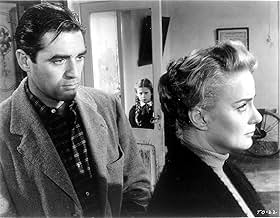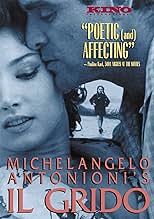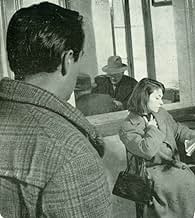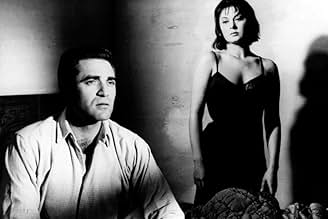IMDb RATING
7.6/10
5.6K
YOUR RATING
A man wanders aimlessly away from his town, away from the woman he loves, emotionally and socially inactive.A man wanders aimlessly away from his town, away from the woman he loves, emotionally and socially inactive.A man wanders aimlessly away from his town, away from the woman he loves, emotionally and socially inactive.
- Awards
- 3 wins & 2 nominations
Gabriella Pallotta
- Edera, her sister
- (as Gabriella Pallotti)
Jacqueline Jones
- Andreina
- (as Lyn Shaw)
Pietro Corvelatti
- Fisherman
- (uncredited)
Elli Parvo
- Donna Matilda
- (uncredited)
Storyline
Did you know
- TriviaMichelangelo Antonioni's first collaboration with his future muse and lover, Monica Vitti. Although Vitti doesn't physically appear in the film, she dubbed the Italian lines for Dorian Gray.
- GoofsAll entries contain spoilers
- ConnectionsFeatured in Cinema Paradiso (1988)
Featured review
Films like Il Grido are nearly impossible to qualify or calculate on any real scale simply because they do not adhere to conventional rules of filmmaking. Michelangelo Antonioni's existential journey is very episodic in nature as we watch a self-contained man travel away from his lover in search of more fulfilling relationships after she turns down his marriage proposal. What follows may or may not make an emotional impact on the viewer as it is very languid pacing and tediously told. Antonioni fills the screen with endless long shots and long takes of the most desolate, empty and vast areas possible, especially for a country known to be so vibrant and fruitful as Italy. This seems to represent the protagonist's soul, his yearning for some sort of satisfaction that he cannot seem to grab a hold of. Despite the downtrodden mood of the film, it is a captivating journey, exploring the depths and lengths to which humans seek pleasure in any form. Of course, this assumes that pleasure is the right word.
- How long is Il Grido?Powered by Alexa
Details
Box office
- Gross US & Canada
- $16,549
- Opening weekend US & Canada
- $6,536
- Nov 10, 2024
- Gross worldwide
- $17,413
- Runtime1 hour 56 minutes
- Color
- Sound mix
- Aspect ratio
- 1.33 : 1(original ratio)
Contribute to this page
Suggest an edit or add missing content




























